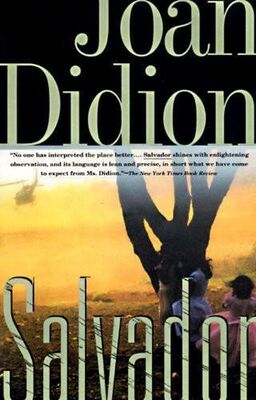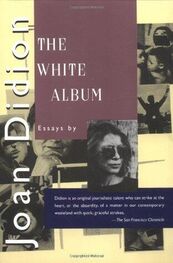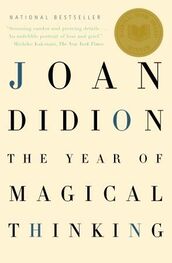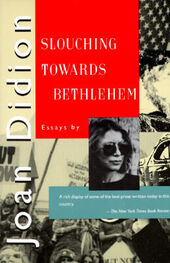Similarly, there was the question of how much money had left the country for Miami since 1979: Deane Hinton, in March of 1982, estimated $740 million. The Salvadoran minister of planning estimated, the same month, twice that. I recall asking President Magaña, when he happened to say that he had gone to lunch every Tuesday for the past ten years with the officers of the Central Reserve Bank of El Salvador, which reviews the very export and import transactions through which money traditionally leaves troubled countries, how much he thought was gone. “You hear figures mentioned,” he said. I asked what figures he heard mentioned at these Tuesday lunches. “The figure they mentioned is six hundred million,” he said. He watched as I wrote that down, 600,000,000, central bank El Salvador . “The figure the Federal Reserve in New York mentioned,” he added, “is one thousand million.” He watched as I wrote that down too, 1,000,000,000, Fed NY . “Those people don’t want to stay for life in Miami,” he said then, but this did not entirely address the question, nor was it meant to.
Not only numbers but names are understood locally to have only a situational meaning, and the change of a name is meant to be accepted as a change in the nature of the thing named. ORDEN, for example, the paramilitary organization formally founded in 1968 to function, along classic patronage lines, as the government’s eyes and ears in the countryside, no longer exists as ORDEN, or the Organización Democrática Nacionalista, but as the Frente Democrática Nacionalista, a transubstantiation noted only cryptically in the State Department’s official “justification” for the January 28 1982 certification: “The Salvadoran government, since the overthrow of General Romero, has taken explicit actions to end human rights abuses. The paramilitary organization ‘ORDEN’ has been outlawed, although some of its former members may still be active .” (Italics added.)
This tactic of solving a problem by changing its name is by no means limited to the government. The small office on the archdiocese grounds where the scrapbooks of the dead are kept is still called, by virtually everyone in San Salvador, “the Human Rights Commission” (Comisión de los Derechos Humanos), but in fact both the Human Rights Commission and Socorro Jurídico, the archdiocesan legal aid office, were ordered in the spring of 1982 to vacate the church property, and, in the local way, did so: everything pretty much stayed in place, but the scrapbooks of the dead were thereafter kept, officially, in the “Oficina de Tutela Legal” of the “Comisión Arquidiocesana de Justicia y Paz.” (This “Human Rights Commission,” in any case, is not to be confused with the Salvadoran government’s “Commission on Human Rights,” the formation of which was announced the day before a scheduled meeting between President Magaña and Ronald Reagan. This official comisión is a seven-member panel notable for its inclusion of Colonel Carlos Reynaldo López Nuila, the director of the National Police.) This renaming was referred to as a “reorganization,” which is one of many words in El Salvador that tend to signal the presence of the ineffable.
Other such words are “improvement,” “perfection” (reforms are never abandoned or ignored, only “perfected” or “improved”), and that favorite from other fronts, “pacification.” Language has always been used a little differently in this part of the world (an apparent statement of fact often expresses something only wished for, or something that might be true, a story, as in García Márquez’s many years later, as he faced the firing squad, Colonel Aureliano Buendía was to remember that distant afternoon when his father took him to discover ice ), but “improvement” and “perfection” and “pacification” derive from another tradition. Language as it is now used in El Salvador is the language of advertising, of persuasion, the product being one or another of the soluciones crafted in Washington or Panama or Mexico, which is part of the place’s pervasive obscenity.
This language is shared by Salvadorans and Americans, as if a linguistic deal had been cut. “Perhaps the most striking measure of progress [in El Salvador],” Assistant Secretary of State Thomas Enders was able to say in August of 1982 in a speech at the Commonwealth Club in San Francisco, “is the transformation of the military from an institution dedicated to the status quo to one that spearheads land reform and supports constitutional democracy.” Thomas Enders was able to say this precisely because the Salvadoran minister of defense, General José Guillermo García, had so superior a dedication to his own status quo that he played the American card as Roberto D’Aubuisson did not, played the game, played ball, understood the importance to Americans of symbolic action: the importance of letting the Americans have their land reform program, the importance of letting the Americans pretend that while “democracy in El Salvador” may remain “a slender reed” (that was Elliott Abrams in The New York Times ), the situation is one in which “progress” is measurable (“the minister of defense has ordered that all violations of citizens’ rights be stopped immediately,” the State Department noted on the occasion of the July 1982 certification, a happy ending); the importance of giving the Americans an acceptable president, Alvaro Magaña, and of pretending that this acceptable president was in fact commander-in-chief of the armed forces, el generalísimo as la solución .
La solución changed with the market. Pacification, although those places pacified turned out to be in need of repeated pacification, was la solución . The use of the word “negotiations,” however abstract that use may have been, was la solución . The election, although it ended with the ascension of a man, Roberto D’Aubuisson, essentially hostile to American policy, was la solución for Americans. The land reform program, grounded as it was in political rather than economic reality, was la solución as symbol. “It has not been a total economic success,” Peter Askin, the AID director working with the government on the program, told The New York Times in August 1981, “but up to this point it has been a political success. I’m firm on that. There does seem to be a direct correlation between the agrarian reforms and the peasants not having become more radicalized.” The land reform program, in other words, was based on the principle of buying off, buying time, giving a little to gain a lot, mini-fundismo in support of latifundismo , which, in a country where the left had no interest in keeping the peasants less “radicalized” and the right remained unconvinced that these peasants could not simply be eliminated, rendered it a program about which only Americans could be truly enthusiastic, less a “reform” than an exercise in public relations.
Even la verdad , the truth, was a degenerated phrase in El Salvador: on my first evening in the country I was asked by a Salvadoran woman at an embassy party what I hoped to find out in El Salvador. I said that ideally I hoped to find out la verdad , and she beamed approvingly. Other journalists, she said, did not want la verdad . She called over two friends, who also approved: no one told la verdad . If I wrote la verdad it would be good for El Salvador. I realized that I had stumbled into a code, that these women used la verdad as it was used on the bumper stickers favored that spring and summer by ARENA people. “JOURNALISTS, TELL THE TRUTH!” the bumper stickers warned in Spanish, and they meant the truth according to Roberto D’Aubuisson.
Читать дальше








